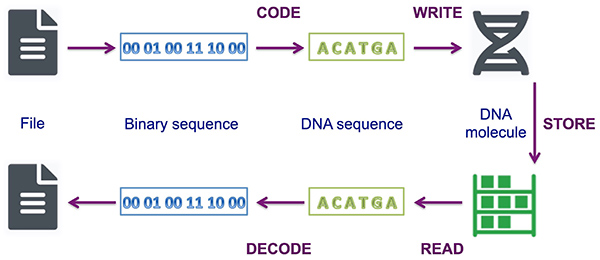 |
||
Home > TERATEC FORUM > Workshops > Workshop 4
Workshop 04 - 09:00 to 12:30 pm
Technologies and applications of the future
Chaired by Christian Saguez, co-founder and honorary president, Teratec
Archiving big data in DNA
By François Kepes, National Academy of Technologies of France, National Academy of Technologies of France
 |
Information has been the driving force behind the socio-economic growth of civilisation since its inception. Currently, its storage, archiving and processing by dedicated centres no longer offers sufficient margins for optimisation to cope with the deluge of digital data, and its problematic environmental impact.
Indeed, datacentres store digital big data on hard disks and magnetic tapes that are copied every 5-7 years; they "devour" resources such as land, electricity and scarce materials. In comparison, storage at a molecular scale, on a polymer such as DNA, would allow for a density of up to ten million times greater, extended longevity by a factor of ten thousand, for virtually zero power consumption. The required technologies exist. However, to become economically viable for information archiving, these technologies still require further progress that will emerge within 3-20 years.
 |
Biography: François Képès is a cell biologist and biotechnologist. Since 2018, he leads the working group "DNA: reading, writing, storing information" of the National Academy of Technologies of France (NATF). Author of more than 130 scientific articles or chapters, and author or editor of more than 25 books, he is an editor of international scientific journals and an expert for European and North American funding agencies. François Képès is a member of the NATF and of the French Academy of Agriculture. He founded the institute of Systems and Synthetic Biology (iSSB - Genopole, CNRS, Univ. Evry) and the eponymous master's degree (mSSB - Université Paris-Saclay). A graduate of the Ecole Normale Supérieure, he was Associate Professor of Biology at the Ecole Polytechnique, Associate Professor at the Politehnica of Bucharest, Visiting Professor at Imperial College London, and Director of Research at the CNRS. |
Register now and get your badge here
- TERATEC Forum is strictly reserved for professionals.
- Participation to exhibition, conferences and workshops is free (subject to seats available)
- On line registration is obligatory.